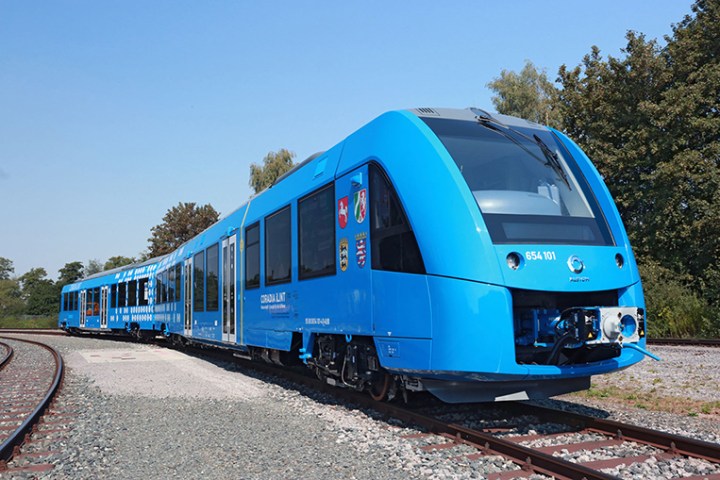
What sets the Coradia iLint apart is its unique method of power generation. Instead of relying on fossil fuels like diesel, the iLint is powered by lithium ion batteries that are supplied a charge by an onboard hydrogen fuel cell. When compared to diesel engines, the hydrogen engine of the iLint is environmentally friendly, producing only steam and condensed water as byproducts. And if that doesn’t make it the greenest train on the planet, this other advantage will.
According to Die Welt, Alstom also is in the business of recycling waste hydrogen in its fuel cells. The hydrogen is supplied by chemical companies that typically would burn the hydrogen instead of putting it to good use as a fuel source. “Alstom is proud to launch a breakthrough innovation in the field of clean transportation,” said Alstom CEO Henri Poupart-Lafarge when the train was first unveiled.
In a country where more than 4,000 diesel trains are in operation, the hydrogen engine is an operator’s dream. The hydrail can travel at speeds up to 87 mph and can cover almost 500 miles a day. It also is incredibly quiet, with the only noise coming from the wheels on the rails, and air resistance as the train rushes down the track.
Alstrom may be the first firm to use hydrogen fuel in a train, but it is not the first company to take advantage of this clean power source. NASA has been using hydrogen in rocket boosters since the 1970s, sending its rockets skyward with a burst of steam. Car manufacturers also have dabbled with hydrogen, but have not yet released a high-volume hydrogen-powered production model to the public.
Alstom is in the final stages of preparing its hydrail for public release. The trains are undergoing the last stages of testing and regulatory approval process this fall. If this process is a success, Alstom is expected to offer public hydrail service by December 2017. Interest in the hydrogen-powered train is mounting, with northern Germany’s Lower Saxony placing an order for 14 of the trains when they become available next year.
Editors' Recommendations
- Hyundai’s hydrogen fuel cell truck makes hauling freight green and glamorous
- Next-gen Toyota Mirai confirmed despite continuing issues with hydrogen tech
- BMW teases hydrogen cars again with fuel cell X5 concept
- Hyundai Nexo is the first fuel-cell vehicle crash-tested by the IIHS
- Colorado will adopt California’s zero-emission vehicle mandate to boost EV sales




